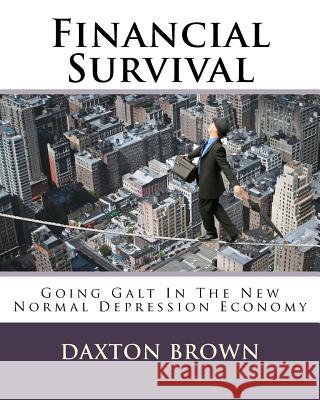Financial Survival: Going Galt In The New Normal Depression Economy » książka
Financial Survival: Going Galt In The New Normal Depression Economy
ISBN-13: 9781496170705 / Angielski / Miękka / 2014 / 314 str.
We are in a Global financial collapse as worldwide welfare states meet the brick wall of exponential deficits and aging demographics. Political and economic reform will not come soon enough to avert a meltdown. Thus the central theme of "Financial Survival" is providing the skills and information you need to survive a Second Great Depression. Because economic fundamentals have changed, your financial strategies will be tested in ways unlike the First Great Depression In the future, you won't only be facing long expected inflationary pressures as the Federal Reserve and Central Banks worldwide attempt to paper over the massive deficits of profligate welfare governments. You will also face intense deflationary pressures as wages and savings are crushed, money velocity falls and economic activity slows due to the loss of trust. This is the New Normal. Your financial future is at risk and your skills will need serious restructuring; the old ways will not work as fiat currencies are debased and collapse. Your goal is to at least make it through the collapse with your financial assets intact, and better still to be in position to profit from the opportunities that present themselves even in imploding markets. It won't be easy, but it is doable and the purpose of this book is to get you to the other side of a financial abyss which may last decades. The author's background is in engineering, economic modeling software and commercial real estate with a good dose of entrepreneur thrown in. This book relies on concepts from feedback control and information theory (the kind of nuts and bolts analyses that makes airplanes fly) rather than the intellectual academic pabulum that pads economic consultants and politician's pocketbooks. The failed record of the economic titans running our economy suggests there is much to learn from a perspective grounded in reality rather than ivory tower preening. You won't find the typical material presented in "Financial Survival" coming from mainstream pundits and economists schooled in Keynesian fantasy. What you will get is hard economic advice based on gritty experience.
Zawartość książki może nie spełniać oczekiwań – reklamacje nie obejmują treści, która mogła nie być redakcyjnie ani merytorycznie opracowana.











